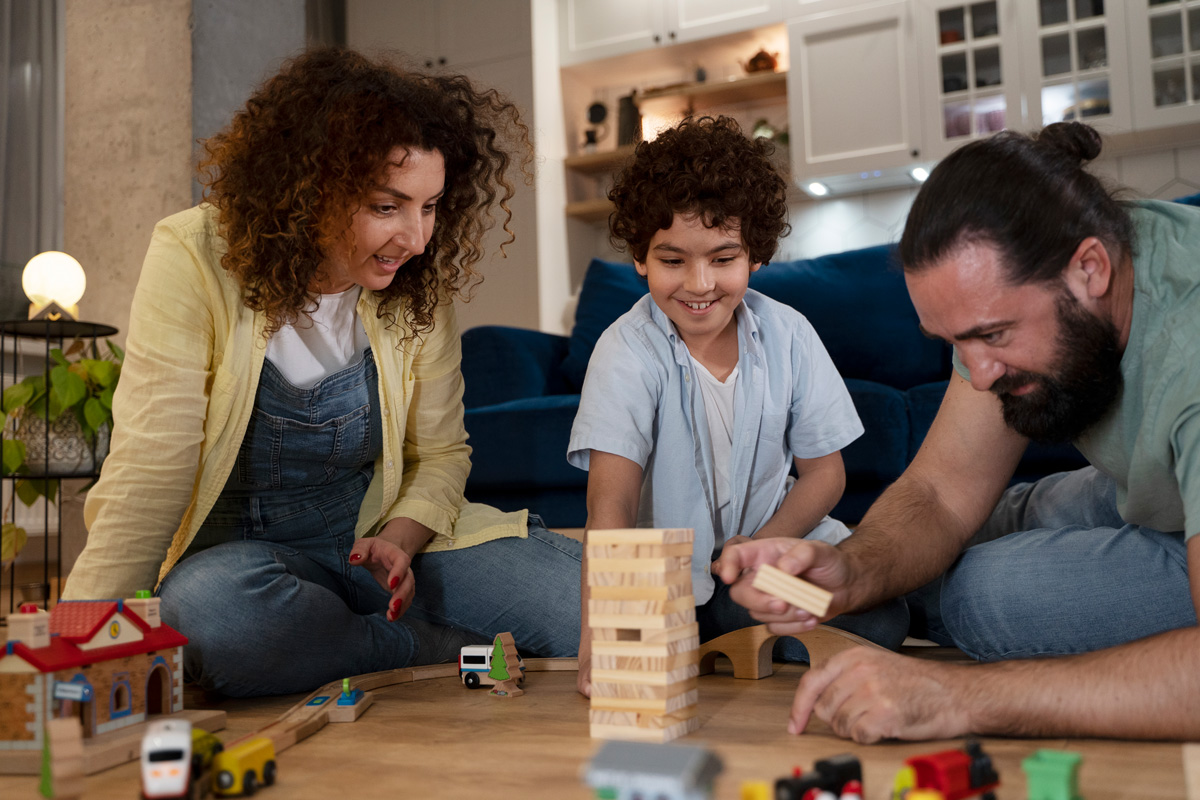As a parent, raising a child with ADHD can be challenging. You may feel overwhelmed, frustrated, and unsure how to best support your child with their impulsivity, inattentiveness, or hyperactivity. Understanding the unique needs of a child with ADHD and learning effective strategies can make a significant difference in your parenting journey. So, how can you provide the best support for your child with ADHD? Parent coaching may be the answer.
What is Parent Coaching?
Parent Coaching for children with ADHD is essentially behavioral parent training, but it goes a step further. It recognizes and addresses the specific challenges that children may face with inattentiveness, hyperactivity, impulsivity, and executive functioning issues. This tailored approach helps parents navigate these challenges effectively. Thus, ensuring they can support their child’s unique needs. Parent Coaching typically involves parents working one-on-one with a trained therapist.
for children with ADHD is essentially behavioral parent training, but it goes a step further. It recognizes and addresses the specific challenges that children may face with inattentiveness, hyperactivity, impulsivity, and executive functioning issues. This tailored approach helps parents navigate these challenges effectively. Thus, ensuring they can support their child’s unique needs. Parent Coaching typically involves parents working one-on-one with a trained therapist.
The coach works with parents to implement specific strategies and tools for managing their child’s behaviors and improving family dynamics. For example, they may help parents create a consistent structure and routine, set realistic expectations for their child’s behavior, and practice positive reinforcement techniques. According to a study published in the Journal of Clinical Child & Adolescent Psychology, behavioral parent training programs, like parent coaching, have been shown to improve child behavior in 60-80% of cases involving ADHD.
Why is this Approach Effective?
Research indicates that behavioral interventions, including parent coaching, are the most effective method for helping children with ADHD. This includes managing symptoms like hyperactivity, impulsiveness, and inattention. In fact, it is more effective than having a therapist work one-on-one with your child alone. Young children usually do not have the maturity to change their own behavior without their parent’s help. Therefore, parent coaching empowers parents to adjust their interactions with their children. This promotes positive behaviors while minimizing those that lead to challenges.
Parent coaching is particularly effective because it equips parents with practical strategies tailored to their child’s unique needs. By fostering a consistent and supportive home environment, children with ADHD can experience significant improvements. In their behavior and also academic performance. Furthermore, parent coaching helps reduce parental stress and enhances overall family dynamics, creating a more harmonious and nurturing home life.
What Behavior Management Strategies are Used in Parent Coaching?
Parent coaching employs a variety of behavior management strategies to help children with ADHD and support their families. These strategies address the unique challenges faced by children with ADHD. They can also provide parents with practical tools to manage these challenges effectively. By implementing these strategies, parents can create a more structured and supportive environment. One that promotes positive behavior and reduces stress for both the child and the family.
- Positive Reinforcement: Encouraging desirable behaviors by rewarding them. This can involve praise, privileges, or tangible rewards to reinforce positive actions and motivate children to repeat them.
- Effective Communication: Teaching parents how to communicate clearly and empathetically with their children. This involves active listening, using positive language, and ensuring that instructions and expectations are understood.
- Setting Clear Expectations: Helping parents establish and communicate clear, consistent rules and expectations for behavior. This helps children understand what is expected of them. But also provides a structured environment that can reduce anxiety and improve behavior.
- Problem-Solving Skills: Equipping parents with techniques to teach their children how to identify problems and develop effective solutions. This can include breaking down tasks into manageable steps and encouraging children to think critically about their choices.
- Organizational Skills: Assisting parents in developing strategies to help their children improve their organizational skills. This might involve creating routines, using visual schedules, and implementing organizational tools. These can help children manage their time and tasks more effectively.
By utilizing these strategies, parent coaching aims to create a supportive and structured environment. One that fosters positive behavior changes and enhances the overall family dynamic. These tools empower parents to better support their child’s unique needs, leading to improved behavior, reduced stress, and a more harmonious home life.
How Can Communication with Your Child Improve?
Improving communication with your child starts with strengthening the relationship between parent and child. Which can sometimes be strained by the challenges of parenting a child with ADHD. Parents can create a more open and effective communication dynamic by fostering a positive and supportive connection. Clear and concise instructions are essential to ensure your child understands what is expected. This involves breaking down tasks into manageable steps and avoiding long lists of directions that can overwhelm your child.
Ensuring that you have your child’s full attention before giving instructions is also crucial.
This is achieved by making eye contact, calling their name, or gently touching their shoulder to focus their attention. Implementing reminders can help your child stay on track. These can be visual aids, timers, or verbal prompts that reinforce the instructions. But also help your child remember what they need to do. Additionally, providing warnings a few minutes before transitions can help your child prepare for changes in activities.
For example, giving a five-minute warning before it’s time to stop playing and start homework. This can help your child mentally prepare for the shift. By incorporating these strategies, parents can improve communication with their children, leading to better understanding, cooperation, and overall family harmony. Strengthening this communication helps manage ADHD-related challenges and enhances the parent-child relationship, fostering a more supportive and nurturing environment.
What Can You Do to Handle Emotional Outbursts?
Handling emotional outbursts in children, especially those with ADHD, requires a calm and strategic approach. The best way to manage these situations is to de-escalate the intensity of the emotions. Encouraging the child to use strategies such as taking deep breaths can help them regain control over their emotions. Additionally, taking a break from the situation can reduce the emotional intensity. Thus, providing the child with the space needed to calm down.
Validating their feelings is crucial, as it helps the child better understand their feeling. It also makes them feel understood and less alone in their experience. Using distractions can also be an effective method, redirecting their focus to something more positive or neutral. These strategies can vary in effectiveness depending on the child, the situation, and the intensity of the outburst. By employing these techniques and seeking parenting support in Arlington, MA, parents can help their children navigate their emotions more effectively. Techniques like these can lead to a more peaceful and supportive home environment.
Setting Realistic Expectations For You and Your Child
 Understanding your child’s strengths and weaknesses is crucial in setting realistic expectations for you and your child. You can boost their confidence and encourage positive behavior by highlighting their strengths. For instance, collaborating with your child’s school to create an Individualized Education Plan (IEP) can help set realistic academic goals considering their learning style and ADHD symptoms. This sets your child up for success and alleviates the pressure on you and your child. Many children with ADHD face challenges in regulating hyperactivity, impulsivity, and inattentiveness in academic settings. By working closely with their school and seeking support from parent coaches, parents can understand their child’s unique needs and set achievable expectations that promote growth and success.
Understanding your child’s strengths and weaknesses is crucial in setting realistic expectations for you and your child. You can boost their confidence and encourage positive behavior by highlighting their strengths. For instance, collaborating with your child’s school to create an Individualized Education Plan (IEP) can help set realistic academic goals considering their learning style and ADHD symptoms. This sets your child up for success and alleviates the pressure on you and your child. Many children with ADHD face challenges in regulating hyperactivity, impulsivity, and inattentiveness in academic settings. By working closely with their school and seeking support from parent coaches, parents can understand their child’s unique needs and set achievable expectations that promote growth and success.
Improving social skills and peer interactions is another key area where parents can significantly impact.
Children with ADHD often struggle to regulate their emotions during social interactions. Thus leading to feelings of overwhelm, impatience, or frustration. In social settings, they may get distracted or dominate conversations, which peers can perceive as inattentiveness or unfriendliness. Parents can help by providing opportunities for their children to practice social skills through playdates and social activities. Offering immediate feedback on social mishaps and inappropriate behaviors, praising improved social skills, and reinforcing areas that need more work can significantly enhance their social interactions. According to a study published in the Journal of Attention Disorders, social skills training has been shown to improve peer relationships in approximately 75% of children with ADHD.
It Can Boost Your Confidence
Parent coaching plays a vital role in boosting confidence in parenting abilities. It empowers caregivers with the knowledge, skills, and confidence to navigate complex situations with their children. By understanding the underlying causes of their child’s behavior and learning effective communication and management techniques, parents can feel more equipped to handle challenging situations. This support helps them foster their child’s development while building a more harmonious and supportive home environment. Parenting coaching also provides a safe and non-judgmental space for parents to express their concerns and challenges without fear of criticism. This can greatly reduce parental stress and increase confidence in their parenting abilities as they learn effective strategies to manage their child’s ADHD.
What Should You Look For in a Parenting Coach?
When selecting a parenting coach, it is essential to ensure they have experience specifically in parent coaching and a deep understanding of ADHD. It’s not enough for a coach to have general parenting knowledge; they must be well-versed in delivering behavioral parent training tailored to the unique needs of children with ADHD. Unfortunately, many parent coaches lack experience with well-proven behavioral parent training programs. Look for a coach familiar with and has delivered programs such as Collaborative Problem Solving, MATCH: Modular Approach to Therapy for Children, The Incredible Years, or Parent-Child Interaction Therapy (PCIT).
These programs are backed by research and have been proven to effectively reduce outbursts and improve behavior in children with ADHD. Choosing a coach with expertise in these methodologies ensures that you receive evidence-based support, which can significantly enhance your child’s development and improve family dynamics. For parents seeking effective parenting support in Arlington, MA, working with a qualified and experienced parenting coach can make all the difference in managing ADHD-related challenges and fostering a positive, nurturing environment for their children.
What Should You Expect in a Parent Coaching Session?
In a parent coaching session, you can expect the therapist to focus primarily on working with you, the parent, rather than directly with your child. This approach allows for the introduction of new strategies that can be tailored to your specific circumstances, taking into account your child’s challenges, age, and your preferences as a parent. The coach will collaborate with you to customize the implementation of each strategy to ensure it fits your family’s unique needs well. During the sessions, the therapist will help you understand and practice these strategies, providing guidance on how to apply them effectively at home. You will also receive specific homework assignments designed to reinforce the weekly strategies and monitor progress.
This ongoing practice is crucial for making meaningful changes and ensuring you get the most out of the coaching process.
Typically, therapists will work with parents on a weekly basis for an average of 10-12 weeks. However, the length of treatment can vary based on several factors. This includes the nature and severity of the issues being addressed, the frequency of sessions, and how diligently the skills are practiced between sessions. By committing to this process, you can expect significant improvements in your ability to manage your child’s behavior and enhance family dynamics. Seeking parenting support in Arlington, MA, can give you the tools and guidance to navigate these challenges effectively.
Parent coaching can play a significant role in supporting children with ADHD and their families. By working closely with a parenting coach with experience and expertise in ADHD, parents can gain valuable knowledge and skills to manage their child’s behavior and enhance family dynamics. This support can significantly improve the parent’s and child’s academic performance, social skills, and confidence. If you have a child with ADHD or are struggling to manage your child’s challenging behaviors, consider seeking qualified parenting support. It can make all the difference in helping your child reach their full potential and promoting a more harmonious home environment for everyone.
ADHD Treatment in Arlington, MA, Can Offer Parenting Support
Managing a child with ADHD can be overwhelming and challenging, but it doesn’t have to be a journey you take alone. Seeking support from qualified therapists specializing in ADHD can provide you with the tools, guidance, and understanding needed to navigate these challenges effectively. By investing in parent coaching and therapy for your child’s ADHD, you are investing in their future and setting them up for success. The Bain Health and Wellness Center offers expert ADHD therapy in Arlington, MA, and parent coaching services that can transform your parenting journey. Our experienced therapists use evidence-based techniques, such as Behavioral Parent Training and Cognitive-Behavioral Therapy, to help children with ADHD and their families thrive.
- Reach out today to begin your free 20-minute consultation.
- Speak with an experienced child therapist.
- Enhance your parenting skills with our parent coaching services!
Other Therapy Services Offered at The Bain Health and Wellness Center in Arlington, MA, and Throughout Massachusetts
In addition to ADHD therapy and parent coaching, the Bain Health and Wellness Center offers a range of other therapy services to support your family’s needs. we offer in-person and virtual therapy for children, teens, and young adults with autism, ADHD, anxiety, depression, trauma, OCD, and more. All mental health therapists at BainHWC are trained in evidence-based treatment and have several years of experience working with children, teens, and young adults. Reach out Today!






